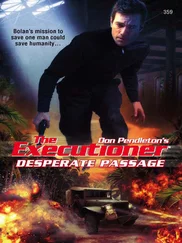Итан Рарик - Desperate Passage
Здесь есть возможность читать онлайн «Итан Рарик - Desperate Passage» весь текст электронной книги совершенно бесплатно (целиком полную версию без сокращений). В некоторых случаях можно слушать аудио, скачать через торрент в формате fb2 и присутствует краткое содержание. Жанр: Путешествия и география, на английском языке. Описание произведения, (предисловие) а так же отзывы посетителей доступны на портале библиотеки ЛибКат.
- Название:Desperate Passage
- Автор:
- Жанр:
- Год:неизвестен
- ISBN:нет данных
- Рейтинг книги:4 / 5. Голосов: 1
-
Избранное:Добавить в избранное
- Отзывы:
-
Ваша оценка:
- 80
- 1
- 2
- 3
- 4
- 5
Desperate Passage: краткое содержание, описание и аннотация
Предлагаем к чтению аннотацию, описание, краткое содержание или предисловие (зависит от того, что написал сам автор книги «Desperate Passage»). Если вы не нашли необходимую информацию о книге — напишите в комментариях, мы постараемся отыскать её.
Desperate Passage — читать онлайн бесплатно полную книгу (весь текст) целиком
Ниже представлен текст книги, разбитый по страницам. Система сохранения места последней прочитанной страницы, позволяет с удобством читать онлайн бесплатно книгу «Desperate Passage», без необходимости каждый раз заново искать на чём Вы остановились. Поставьте закладку, и сможете в любой момент перейти на страницу, на которой закончили чтение.
Интервал:
Закладка:
TAMZENE DONNER WAS MORE SANGUINE. After more than a month on the trail, things were going well, she thought. The Indians had proven surprisingly amiable. The chiefs of a local tribe had taken breakfast at the Donner tent that very morning. "All are so friendly that I cannot help feeling sympathy and friendship for them," she wrote to a friend back home. No cattle had been stolen—at least not "where proper care has been taken"—and the previous night two men who had exhausted their horses in a hard hunt had slept out in the open, a sign they feared no attack.
The open spaces of the prairie provided "a first rate road," and the countryside was "beautiful beyond description." Even crossing the creeks, though difficult, presented no real danger. The grass, sparse from lack of rain the year before, was plentiful for the cattle, and the cows produced ample supplies of milk and butter. Russell had proved an "amiable" captain, although she had to admit the wagon train was a mixed band. "We have [some] of the best of people in our company, and some, too, that are not so good."
Tamzene herself was making time for reading and botany. She had found tulips, primrose, lupine, "the ear-drop," larkspur, creeping holly-hock, and a "beautiful flower" she could not identify but that resembled the bloom of the beech tree. Most of her time, she admitted, was consumed with cooking, but even that was hardly an onerous chore. She was a little concerned that their flour might run low, but rice and beans and cornmeal were proving good staples, and the hunters were bringing in plenty of meat. As fuel, "Buffalo chips are excellent—they kindle quick and retain heat surprisingly." That night they had dined on buffalo steaks that were as tasty as if they had been cooked over hickory coals.
She estimated they had traveled 450 miles since leaving Independence and had only 200 more miles to go before reaching Fort Laramie. Unlike the cautious Edwin Bryant, she was buoyed by optimism. "Indeed," she wrote, "if I do not experience something far worse than I have yet done, I shall say the trouble is all in getting started."
4
Pleasure Trip
Virginia Reed swung into the saddle of her pony and galloped out onto the prairie. She loved getting away from the dull plod of the wagons, out into the high grasses where the wind whistled through a girl's hair as she rode. She stopped from time to time and gathered wildflowers, the bright sunshine glinting off a dazzling palette of colors in her growing bouquet.
The oldest of the four Reed children, Virginia had been born Virginia Backenstoe, the daughter of her mother's first husband. He died when Virginia was barely a year old, and when her mother remarried a year after that, James Reed adopted her. He treated his stepdaughter as his own, and Virginia grew into a spirited young woman, twelve now and looking forward to her thirteenth birthday in only a few days. In time, she would show a gift for describing the Donner Party's plight in pithy, moving letters.
She could scarcely remember the first time she had been set in a saddle. Outings with her adoptive father had always leavened her mood, the two of them sharing their love of horses and riding, and as she had contemplated the westward trip the previous winter, it was the prospect of daily jaunts on her prized pony, Billy, that made Virginia smile. The valley of the Platte River, up which the wagons were now rolling, was a smooth and welcoming road, perfect for riding, and Virginia took full advantage. Every morning, she stroked Billy's face and talked to him as though he were human. "I wonder what we will see today," she would say, feeling the softness of his mane between her fingers. "Take good care of me, Billy, and don't let me get hurt." He would bow his head as if to promise her safe return, and off they would ride into the freedom of the prairie. To her, it was a portion of the journey that was nothing less than "an ideal pleasure trip."
With hundreds of miles behind them, the wagon trains had by now settled into a daily rhythm. At dawn or before, a trumpeter sounded reveille to rouse the camp. The women made coffee and fried bacon for breakfast, the wafting scent tempting laggards from their bedrolls. If the oxen had been set loose to graze the night before, they were driven into the corral formed by the wagons, and men began to hitch the teams. George Donner, perhaps still playing his hometown role of "Uncle George," liked to encourage a little hustle by mounting a small gray pony and riding about camp, bellowing out, "Chain up, boys! Chain up!" If things went well, wagons rolled out of camp by 7:00 or 7:30. At 12:00, they stopped for lunch, perhaps pickled pork and baked beans, cold ham, bread and butter, pickles, cheese, and dried fruit, with coffee and tea, and milk for the children. "Nooning," as the emigrants invariably called it, might be a short break or might stretch out for an hour, giving both the people and the animals a chance to rest. Depending on where they found water and grass for the animals, they stopped for the night sometime between 4:00 and 6:00, forming the wagons into a corral once again. If they were passing through a region where they feared Indian attack, the horses and oxen were driven inside the ring of wagons; if not, they were turned loose to graze, although guards were still posted to protect against wolves or other predators. Occasionally, the mosquitoes were so thick that emigrants feared for the health of the livestock, so the animals would be penned or picketed and fires lit nearby in hopes that the smoke would drive away the insects. To save space for the livestock inside the ring of wagons, tents and campfires were placed outside. Men worked on repair jobs or cared for the animals, while women and children fetched water for cooking and gathered wood or buffalo dung—euphemistically known as "chips"—for fires. In the evening, if exhaustion could be held at bay, a fiddler might scratch out a tune. If spirits were high there might even be singing or a little dancing. At the end of the night, families took to their tents and guards took up their weapons, although frequently the sentries fell asleep.
In all, there were nearly five hundred wagons in this moving community, perhaps half headed to California, half to Oregon. Unfortunately for the Donners and the Reeds, they were near the rear of the long column. In letters home, others traveling with them claimed to be trailing by design, convinced that their slow pace helped preserve their livestock. The lead wagons, they believed, were working the animals too hard. Draft stock were priceless. Driving the poor animals until they collapsed was the ultimate example of short-term thinking, a way to make a few extra miles now and suffer more later. The race, in the end, would go to the tortoise, not the hare.
THE WAIL OF A NEWBORN sang out from one of the wagons, a happy broadcast carried along by the stiff prairie wind. Philippine Keseberg, a young German immigrant going west with her husband and three-year-old daughter, lay back, exhaled, and cradled her new baby boy. They named him for his father. Farther back on the trail, the family wagon had tipped over, throwing Philippine from the bed and plunging her into a pool of water, but the accident seemed to have had no major ill effects, and Lewis Keseberg Jr. emerged into the world as the newest member of the migration.
Although he would be the only trailside baby born to the members of the Donner Party, little Lewis was hardly unique. It was not uncommon for women to give birth during the journey, nor, interestingly, less than nine months after its completion. Pregnancy rarely slowed the trains, at least for long. Maybe the Kesebergs spent a little extra time in camp the next day, or perhaps the other women lent a hand with the family's washing, but Philippine Keseberg and her son, like everybody else, kept moving west.
Читать дальшеИнтервал:
Закладка:
Похожие книги на «Desperate Passage»
Представляем Вашему вниманию похожие книги на «Desperate Passage» списком для выбора. Мы отобрали схожую по названию и смыслу литературу в надежде предоставить читателям больше вариантов отыскать новые, интересные, ещё непрочитанные произведения.
Обсуждение, отзывы о книге «Desperate Passage» и просто собственные мнения читателей. Оставьте ваши комментарии, напишите, что Вы думаете о произведении, его смысле или главных героях. Укажите что конкретно понравилось, а что нет, и почему Вы так считаете.












